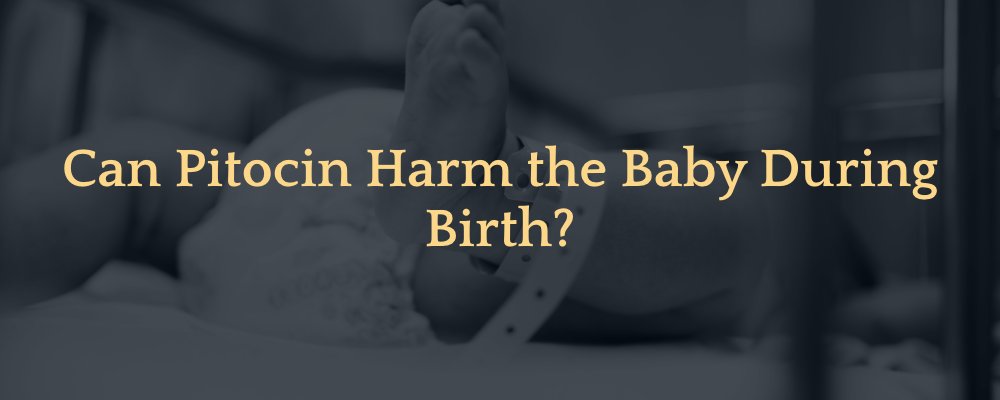No recovery • no fee
480.991.7677
scottsdale • phoenix
Can Pitocin Harm the Baby During Birth?
Published on March 14, 2023
Childbirth is a complex process of human physiology, involving an alignment in timing between the mother’s uterus and cervix together with the development of the baby. With the advancement of medical science, physicians have been able to intervene in that synchronistic process in a way that has saved countless lives when something goes wrong. Still, there are legitimate questions within the medical community about how often doctors use these interventions, whether they are sometimes used unnecessarily, and what happens when unnecessary intervention causes harm to a mother or child in the birthing process.
One very common medical intervention today is the use of Pitocin to induce labor, speed up a stalled or slow labor, or to strengthen uterine contractions. While the medical community regards this widely used medication as safe, that pronouncement offers little solace to those who have suffered injuries from Pitocin—a medication that one researcher and a one-time president of the International Federation of OBGYN called “the most widely abused drug in the world, necessary only in about 3% of childbirths … yet estimation of its use is as high as in 60% of labors.”

What is Pitocin?
Pitocin is a synthetic imitation of the hormone, oxytocin—which a woman’s body produces in waves during natural labor to begin contractions. The medication works through an IV or injection to stimulate contractions and accelerate labor. Typically, a nurse will increase the level of Pitocin as labor progresses. A woman should never receive Pitocin if her cervix isn’t softened, shortened, and turned—all signs that the cervix is ready to open for delivery.
The use of Pitocin carries significant risks, yet often healthcare providers give a second dose before the first dose of this medication has had enough time to begin its effects. Further, Pitocin may be administered without the patient’s full, informed consent, with many women remaining unaware of the potential risks.
How Does Pitocin Cause Birth Injury?
Pitocin stimulates contractions in laboring women, increasing the speed and strength of contractions. No two women react in exactly the same way to Pitocin, so determining an exact appropriate dosage for each unique woman isn’t possible. Pitocin can cause hyper-stimulation of contractions leading to fetal distress. When the uterus contracts, it causes compression of the placenta which delivers oxygen and nutrients to the unborn baby. The compression ceases between contractions, allowing vital oxygen to reach the baby’s brain. When labor becomes overstimulated with unnaturally intense and frequent contractions, the baby may not experience the critical delivery of essential oxygen needed between contractions, increasing the chance of birth injuries. Oxygen deprivation during delivery is a leading cause of Cerebral Palsy and other brain injuries.
What are Tetonic Contractions in Pitocin Birth Injuries?
Because some women react very strongly to the same dose of Pitocin that would have little effect on another woman, and the delayed effect may mean a laboring woman receives a second dose before the first takes action, some women experience tectonic contractions or contractions of such strength that they cause uterine rupture. Women with uterine scars from a previous c-section delivery are especially at risk of a uterine rupture.
When a woman experiences a uterine rupture, immediate emergency surgery is required to prevent hemorrhage, loss of oxygen to the baby, and great risks to both mother and child. A ruptured uterus can cause oxygen-deprivation-related birth injuries including the possibility of death to the baby and/or mother. It can also leave a surviving mother unable to bear more children.
Are Pitocin-Related Birth Injuries Medical Malpractice?
If you and/or your baby suffered an injury from Pitocin, you could have a case for a medical malpractice lawsuit if Pitocin was over-administered, used without cause, or administered without informed consent including informing a laboring mother of all risks associated with the medication. Contact a Phoenix medical malpractice lawyer at Knapp & Roberts today to schedule a free consultation.
Let us tell your story
we care, and we can help. Contact us 480-991-7677 or fill out the form below
The personal injury attorneys in Phoenix, Arizona, at Knapp & Roberts have the compassion and trial lawyer skills to tell your story to a jury. We will get to know you and your family so that we can help the jury understand what has happened to you and your family and how it has changed your lives. Obtain the compensation necessary for the injuries and losses you have suffered.
Bob L. - "Mr. Knapp helped me with decisions I did not know how to deal with until he gave me excellent legal and medical consultation."

